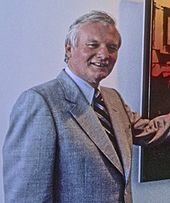Bill Davis
William Grenville "Bill" Davis , PC , CC , O.Ont , QC (born July 30, 1929 in Brampton ) is a Canadian attorney, politician and was the 18th Prime Minister of Ontario from March 1, 1971 to February 8, 1985 . Davis is a member of the Progressive Conservative Party of Ontario , whose party chair he also held in the years as premier.
Life
Education and political beginnings
Bill Davis was born in Brampton in 1929 to Albert Grenville and Vera M. (Hewetson) Davis. Davis was politically active from a young age and at 17 was appointed the youngest delegate to a national congress for the Progressive Conservative Party of Canada . He studied and graduated from the University of Toronto in law and attended Osgoode Hall Law School in Toronto in 1951 .
On June 11, 1959 he was - at the age of 29 - elected to the legislative assembly of Ontario for the constituency of Peel . In the election, the conservatives under Leslie Frost won 71% of the vote. The election took place a few months after the general election in 1958 , in which the conservative John Diefenbaker was able to prevail at the federal level . Diefenbaker discontinued the politically controversial program of the Avro Canada interceptor on February 20, 1959. Over 14,000 workers went on strike and protested against the decision of the conservatives. Davis was still able to prevail with a narrow margin of 1203 votes against the challenger Bill Brydon.
He supported the government of Leslie Frost as a backbencher for two years . After Frost's resignation, David was instrumental in the election of John Robarts in 1961. Under his government he was appointed Minister of Education on October 25, 1962. Two years later, his department expanded to include universities and remained in this position until 1971. He proved to be a very assertive politician, founded many new public schools. During his tenure, spending on education in Ontario rose to over 454% between 1962 and 1971. He reformed the school system and created new universities, including Trent University in Peterborough and Brock University, and established the educational television program TVOntario . His profile and commitment meant that he established himself as the new top candidate for the upcoming election.
prime minister
In the 1971 election he was able to assert himself with 78% against the liberal Robert Nixon. Immediately after taking office, he announced that he would stop the construction of the Spadina Expressway to downtown Toronto. He also turned down a proposal to fully fund Catholic schools, which some saw as an appeal to the rural Protestant base of the Progressive Conservative Party. Davis' first term as Prime Minister was initially successful, but later weakened by a series of scandals. There were allegations that the Fidinam company received special attention in the urban development program and that in return the Progressive Conservative Party made donations. In 1973 it was announced that Davis' friend Gerhard Moog had received a lucrative contract to build the new Ontario Hydro headquarters. Whether such investigations relieved the government, the Conservatives lost four important by-elections in 1973 and 1974 . Accordingly, the election to the Ontario parliament in 1975 was much tougher. Davis was able to be confirmed as prime minister with 51% compared to Stephen Lewis, who came in second, from the Ontario New Democratic Party with 38%, but had to form a minority government. In 1977 an early election was called, after which Bill Davis could only lead a minority government again.
Unlike most other Canadian Prime Ministers, Davis supported then Prime Minister Pierre Elliott Trudeau in his plans in 1981 to make Canada independent from the United Kingdom and to rewrite parts of the Canadian constitution . These efforts eventually culminated in the passage of Canada Law a year later .
A few months before the end of his regular term in office, Davis resigned as Prime Minister of Ontario after nearly 14 years. It is the second longest tenure of a Prime Minister in Ontario. His successor was his party colleague Frank Miller . With his resignation, Davis also stepped down from the political stage.
literature
- Claire Hoy: Bill Davis: a biography , Methuen Toronto 1985, ISBN 978-0458991303 .
- Rosemary Speirs: Out of the blue: the fall of the Tory dynasty in Ontario , MacMillan Toronto 1986, ISBN 978-0771598975 .
Web links
- Bill Davis ( English, French ) In: The Canadian Encyclopedia .
- Bill Davis. In: Database of the Legislative Assembly of Ontario
- Toronto Sun : Bill Davis' politics were anything but 'bland' , article by Steve Paikin on June 30, 2009
- TVOntario: William Davis Moves On - Information and video about Bill Davis
Individual evidence
- ^ Who's who in Canada , Volume 62, International Press 1973, p. 45.
| personal data | |
|---|---|
| SURNAME | Davis, Bill |
| ALTERNATIVE NAMES | Davis, William Grenville |
| BRIEF DESCRIPTION | Canadian attorney, politician, and 18th Ontario Prime Minister |
| DATE OF BIRTH | July 30, 1929 |
| PLACE OF BIRTH | Brampton, Ontario |
